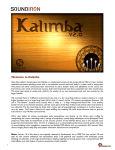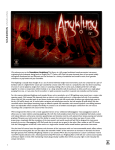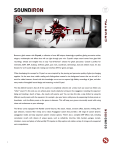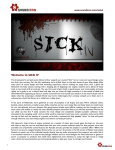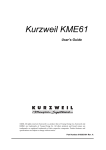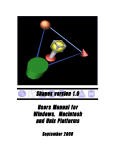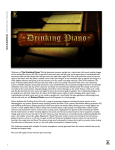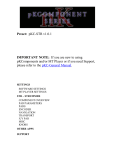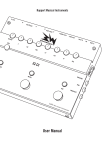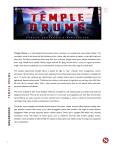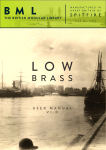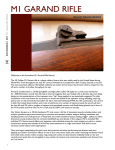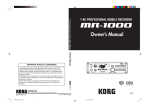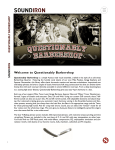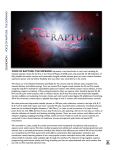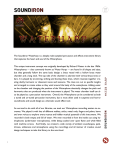Download SOUNDIRON
Transcript
SOUNDIRON BRAD HOYT’S HARP GUITAR SOUNDIRON Welcome to Brad Hoyt’s Harp Guitar! Brad Hoyt’s Harp Guitar is a powerful completely multi-sample based full range 30-string acoustic harp guitar library. It offers powerful single-note lead, chord creation, rhythm building, gliss and strum performance, all with total real-time control and automation support. We sampled plucks, palm mutes, chokes, slides, glisses, scrapes, guitar body percussion and tons of other effects to fully capture every nuance of this exquisite instrument, with deep round-robin and velocity layering and total attention to detail. It was recorded up close and dry, in wide stereo through a matched pair of large studio Neumann microphones and Sound Devices preamps for maximum tone, fidelity and clarity. This also gives you the power to shape the sound to work in any arrangement and mix. We sampled the custom-designed harp guitar which was commissioned by classical guitarist Brad Hoyt. This unique instrument, titled the "Arpa Viola Caipira", is the result of a four year design and construction process with master luthier Stephen Sedgwick from the U.K, based on Brad's concept drawings. With a massive and lush tone, wide key range, rich bass and pristine highs, it takes the entire concept of an acoustic guitar to new frontiers. The Harp Guitar library gives you deep round-robin variation, responsive dynamic layering, world-class programming, true legato, auto-strumming, chord-building, adaptive arpeggiation, custom tuning and tons of other exclusive features. As always, we’ve included a collection of ambiences fashioned from the raw source recordings of the Harp Guitar. We’ve also included our comprehensive FX Rack panel, with multi-effects, compression, EQ, amp/speaker simulation and convolution reverb, featuring dozens of our most popular custom recorded rooms, halls, cathedrals and otherworldly fx impulses, all instantly available through the control interface. 1 SOUNDIRON BRAD HOYT’S HARP GUITAR ABOUT BRAD HOYT 2 Brad Hoyt is a composer, pianist and harp guitarist who has recorded with some of the world’s leading guitarists and jazz musicians. His first CD release in 2009 “Together Alone” featured duets with himself and 10 other harp guitarists. His most recent release “Far Away From Everyday” features 30 musicians from around the world including 3x Grammy winner Jeff Coffin, 2x Grammy winner Howard Levy, fingerstyle guitar masters Stephen Bennett, Phil Keaggy, Muriel Anderson, Antoine Dufour, Joscho Stephan and many more. Brad is looking forward to combining elements from both tangible and virtual harp guitar performances in future compositions. For more information on the creation of the Harp Guitar visit: http://www.harpguitars.net/luthiers/hoyt/sedgwick.htm SOUNDIRON BRAD HOYT’S HARP GUITaR SOUNDIRON BRAD HOYT’S HARP GUITAR ONE-OF-A-KIND 30-STRING HARP GUITAR MULTI-SAMPLE LIBRARY 13 powerful open-format Kontakt .nki instrument presets 4,203 Samples 11.8 GB Installed Plucks, Palm-mutes, Chokes, Slides, Hand Percussion, String Percussion, Glisses and Effects. Deep Multi-Sampling with up to 12x RR and up to 7 Velocity Layers Real-time String Selection / Finger Position Control Chord Creator & Auto-Strum Sequencer Independent String Control and Tuning True Legato Slides 24bit / 48kHz stereo PCM wav samples (non-encrypted) Powerful Custom Performance and FX Control Interface Full Effects Rack with chorus, flanger, stereo modeler, compression, amp and cabinet simulation, distortion, delay and convolution reverb with dozens of room and fx impulses to choose from. Note: The full version of Kontakt 5.3.1 or later is required for all Kontakt presets. The free Kontakt “Player” and the Libraries tab do not support this library. CREDITS Recording, Editing, Programming Gregg Stephens, Mike Peaslee, and Spencer Nunamaker Sound Design Gregg Stephens and Mike Peaslee Systems Design & Scripting Chris Marshall, Gregg Stephens UI Design and Artwork Ryo Ishido, Chris Marshall and Gregg Stephens Photography Gregg Stephens and Mike Peaslee Documentation Gregg Stephens TABLE OF CONTENTS INTRODUCTION - Pages 1 - 2 OVERVIEW & CREDITS - Page 3 FIDELITY, REQUIREMENTS, INSTALLATION & LOADING - Page 4 COMMON FRONT PANEL CONTROLS - Page 5 PRESET TYPES & ADVANCED PERFORMANCE - Pages 6 - 10 AUTO-STRUMMER - Pages 11 - 12 AMBIENCE AND PERCUSSION PRESETS - Page 13 UBERPEGGIATOR - Page 14 FX RACK - Page 15 - 17 INSTRUMENT PRESET LIST - Page 18 LICENSE AGREEMENT - Page 19 THANK YOU - Page 20 3 SOUNDIRON BRAD HOYT’S HARP GUITAR Format All of the sample content is included as standard open PCM wav files to allow you easy access to manipulate, reprogram and customize the sounds however you wish. We know that it’s important for many users to be able to go beyond the limitations of any one format, so we’ve kept this library’s directories and files open for our advanced users. As a professional, you may have your own workflow or format requirements, and we trust that you'll respect our hard work and won't share this content with anyone who hasn't paid for it. You’ll need the full retail version of Native Instruments Kontakt 5.3.1 or later to use the nki presets in this library. The free Kontakt “Player” and any other version of Kontakt that came bundled with another library or software product (other than NI’s full “Komplete” package) don’t support this library. The free Kontakt Player is NOT a full version of Kontakt and cannot load or play standard open-format Kontakt instruments, wav samples or libraries. Please read all instrument specs and software requirements before purchasing this or any other Soundiron products to see the full list of software requirements, features and format compatibility for each library. Fidelity This library was recorded in dual mono at 48kHz / 24bit. This was recorded on location in a dry studio environment, but sonic impurities from clothing, body movement and natural mouth and throat sounds may be present in the samples and the softer dynamic layers are naturally quiet, resulting in the presence of lo levels of signal noise. Our goal is to preserve and accentuate the natural live qualities in our instruments without overly modifying and sterilizing the recordings. Therefore, please keep in mind that this library isn’t designed to provide perfectly sterile result. System Requirements Please be aware that many instrument and multiinstrument programs in this library are extremely ram/ cpu and hard disk-streaming resource intensive. We highly recommend that you have a 64-bit operating system (Windows or OSX) with at least 3GB of system ram, a multi-core cpu and a 7200 rpm SATA or SSD hard disk before purchasing this particular Soundiron library. Large sample sets like those found in this library may load slowly and may cause system instability on some machines. Download We provide the Continuata Connect download manager to offer high-speed, reliable and fully automated library downloading and installation. Download and run the latest version for your OS (PC or Mac) before proceeding. You may also need to add special permissions to your security software for the downloader, if it blocks applications from accessing the web. 4 Next, copy-paste your download code from your download email into the Code box in the downloader window. Press the download button and select the location you'd like to download and install the library. It will automatically start downloading the file(s) and then error-check, extract and install the finished library. Once installation is fully complete, you can remove the .rar download files and store them in a safe place as a back-up copy. We always recommend downloading the latest version of our downloader before you begin. The link in your email will always take you to the latest version. Don't move, rename, delete or modify any of the files or folders created during the download until after you see the status message for all files in your download queue display the word "INSTALLED". Please don't close the downloader while it's actively downloading, unless you press the pause button first. To resume downloading, press the Resume button. If you need to resume downloading after closing the downloader, run it again and enter your code and press Download again. Then select the same download/installation location on your computer that you chose originally. If the downloader reports a DL Error or Install error, it will automatically try to download the file again until it successfully downloads and verifies all the data it needs. It’s best to allow it to finish the process before trying to move or access the library data. Please see your download email for more detailed instructions. If you have any trouble with our Downloader utility or prefer to use your browser or another download manager, log into your personal manual download page on our website, by using the direct link in your download email. Log in using your download code. Or, if you used the downloader originally, but you need to re-install the library manually for any reason at a later time you can always re-use the original rar files. To do that, you'll need Winrar, UnrarX or another full-featured Rar extraction utility to extract and install the library. Please note that Stuffit Expander and Winzip DON’T support many types of common rar files. Preset Loading Once installation is complete, you can browse and load the included .nki presets using the Files, Quickload or Database tabs in the Kontakt Browser, or through the main File load/save menu. Please allow any current preset to finish loading completely before loading a new one. You can’t use the Libraries view to load standard openformat Kontakt Instruments like this library. Only locked “Powered-By-Kontakt” Libraries are visible to that propriety browser view. The “Add-Library” function does not support this product or any other open-format Kontakt library. This library doesn’t require any special activation. BRAD HOYT’S HARP GUITAR Common Front Panel Controls This instrument has a variety of special front panel performance controls that allow deep real-time performance customization. Harp Guitar contains multiple preset categories that share a number of common controls which allow users to shape the sound. You can see each control’s internal midi CC assignment by hovering your mouse over many of the controls and looking down at the “hint” text displayed in the Info bar at the bottom of Kontakt. To turn on the Info bar, press the “i” button at the top of Kontakt. To assign midi CC automation to any knob, simply right-click (PC) or Command-Click (Mac) on the knob and then click the Assign Midi CC button that appears. The next midi controller you move will automatically be assigned to the control. You can access more automation features in the “Auto” tab window on the left side of Kontakt. You can customize and create your own custom presets by using the File Save/Load menu at the top of Kontakt. Just choose a new preset name and save it in the same Instrument folder location to insure that Kontakt can locate all necessary files the next time you load it. All custom control knob settings will be saved with the instrument preset. Swell - (CC72) SOUNDIRON This knob controls the volume swell of the instrument. Attack - (CC 74) This controls the sharpness of attack. Lower values have more of a pluck sound. Release - (CC76) This controls the release time of the palm mute, choke and release samples. Lower settings cause the sound to be damped and cut off, while higher settings allow the sounds to ring out longer. Tightness / Offset - (CC78) This controls the amount of sample start offset allowing you to skip ahead into the samples. This can also be used to control the amount of “pluck.” Release Volume - (CC90) This controls the volume of release samples only. These samples play when the last note of a string is released. The small glowing radio button toggles Release Samples on/off if you don’t want them to play at all. Stepping This knob controls the pitch of each layer in semitones with a range of +- 36 semitones. 5 Preset Types ADVANCED PERFORMANCE The Advanced Performance preset simulates the real-world function of the Harp Guitar. Each of the 5 courses of guitar strings of the Harp Guitar is represented as its own monophonic unit with individual modes for slides, hammer-on/pull-offs, palm-mutes and chokes. String ranges are set via the UI but can be overridden. All important functionality is also controllable via keyswitch. Also included are the Bass and Treble Harp string with individual choke and mute control for each. SOUNDIRON BRAD HOYT’S HARP GUITAR The Harp Guitar contains three main preset types: Advanced Performance, Auto-Strummer and Percussion/Ambience. Each preset type offers its own strengths and each was designed to be useful for different composition styles. Also included are “Lite” versions of each preset type which are less CPU and memory-intensive at the cost of realism by reducing the number of round robin variation. Panel Controls Along the bottom right side of the UI are buttons which, when pressed, open a tab with a variety of controls. See page 8 for details. Harp String Controls In the top right of the UI are a set of buttons that switch between palm mute or choked string articulations for both the bass and treble harp strings, independently. The harp strings are totally separate from the guitar strings and are unaffected by the guitar controls. String Play Modes Each string has a variety of toggleable play modes. These can be controlled using keyswitches or via the user interface controls pictured to the left. Each radio button represents a string just like the range controls, low, mid and high from top-to-bottom. The label (like Slide or H.On) can be pressed to toggle the mode on/off for all strings. Please be aware that certain modes override other modes where it makes sense logically, like Palm Mutes and Chokes overwriting one another. 6 ADVANCED PERFORMANCE (Continued) SOUNDIRON This play mode plays slide samples between notes. Keep the previous note held down momentarily after pushing the new note. Slides can also be controlled using the red keyswitches to the far left side of the keyboard. H.On (Hammer-on/Pull-off ) - Choke P.Mute Allow H.On The modes controls live on the neck of the Harp Guitar in the top right of the UI. Slide BRAD HOYT’S HARP GUITAR Slide - This mode simulates hammer-ons and pull-offs. Within the confines of each string, any new note press after the first functions as a hammer-on, and if on note release a lower note is still held, that note will be played simulating a pull-off. This mode can be controlled using the green keyswitches to the far left side of the keyboard. Allow This special functionality is used to override the string ranges that are defined by the user. When active for a string, that string takes precedence over other strings in any natural overlapping ranges. This lets users play notes on strings all the way up the neck. If “Allow” is active for more than one string, all strings “allowed” will sound on notes where they overlap. This can also be controlled using the blue keyswtiches to the far left side of the keyboard. P.Mute (Palm Mute) These switch the string to play palm mutes instead of normal. open notes These can also be controlled using the yellow keyswitches to the far left side of the keyboard. Choke - ^ ^ ^^ ^ ^ 1, 2, 3,4,5, All This mode chokes the string to produce a non-pitched, more percussive sound. This mode can be controlled using the cyan keyswitches to the far left side of the keyboard. Tuning Panel The Tuning Panel found in the row of buttons along the lower right side of the interface provides two main sections of controls. The SCALE section provides controls for constraining all notes to specific scale modes and keys. • Mode The mode knob allows you to select from 28 different modes to which the scale will be constrained. The modes include Major, Minor, Harmonic Minor, Melodic Minor, Dorian, Phrygian, Lydian, Mixolydian, Locrian, Whole Tone, Half Tone-Whole Tone, Whole Tone-Half Tone, Pentatonic, Blues, Chromatic Just, Quarter Tones and more. Key The Key knob allows you to select the key to which the scale will be constrained. You can choose C, D♭, D, E♭, E, F, G♭, G, A♭, A, B♭, and B. Note Gap Fill When using the Scale constrain feature, note outside of the scale will be filled in by one of two methods: the next Higher note will be used or the next Lower note will be used. Pressing the button toggles between these two modes to fill the gaps with the selected method. 7 ADVANCED PERFORMANCE (Continued) SOUNDIRON BRAD HOYT’S HARP GUITAR Independent String Control Each individual course of guitar strings is conceptualized as an independent, monophonic unit, separate from the other strings. This logic mirrors that of the real-world instrument: one can play each string in a different way, perhaps sliding on one string, palm muting another or playing the same note on two different strings. String Controls (Tuning) The knob-value edit pairs pictured to the left represent the guitar strings of the Harp Guitar. These controls can be used to set the range of each string. The highest available note of one string depends on the low note of the string that is higher to prevent gaps and unintentional overlapping. Touching a knob will briefly reveal the full maximum allowable range for the given string while hiding all other keyswitches and playable ranges in Kontakt’s built-in keyboard. String Ranges Pictured below is the built-in Kontakt keyboard with all the playable colored key ranges set to their default settings. The maximum allowable range for each guitar string is shown through the colored lines. The assigned active range is visible in the color-coded keys. Each string’s range is represented on Kontakt’s built-in keyboard (shown below) by the blue (1), red (2), green (3), teal (4) and yellow (5) key ranges in the middle of the keyboard. The string ranges can be overridden on-the-fly using the “Allow” keyswitches and UI controls. Since many notes can be played on several of the strings, you can decide which note is played on which string using either the Tuning range knobs or with the Allow buttons/keyswitches. Bass Harp Treble Harp* B1 - A#2 A#5 - G6 String 5: E4 - E5 String 4: B3 - C#5 String 3: G#3 - A4 String 2: E3 - E4 String 1: B2 - D4 *The Treble Harp strings are placed one octave higher than natural on the keyboard due to the overlapping guitar range. 8 ADVANCED PERFORMANCE (Continued) Settings Panel SOUNDIRON BRAD HOYT’S HARP GUITAR The Settings Panel found in the row of buttons along the lower right side of the interface provides two main sections of controls. The SLIDE section provides controls for adjusting the Slide behavior and volume. The KEYSWITCHES section provides controls for the behavior of the keyswitches. • Range The Range knob allows you to extend or constrain the range in which a “slide” (legato) will be performed. Keep in mind that this is still being performed on a per string basis, so with a range of 12, you will only get a slide sound when the string is either allowed with the “Allow” button or keyswitch or if they range of the string is set to at least 12. The minimum range is 2 and the maximum is 15. Options The Fret Noise knob in the Options section allows you to adjust the volume of the fret slide sounds separate from everything else. The glowing radio button next to the knob will toggle an additional fret scuff sound on every release. This is useful for realistic chord and string transitions. Keyswitches Each of the 5 keyswitches can be either momentary or latching. Momentary keyswitches reset after the keyswitch key is released. Latching keyswitches toggle the state on each key press. Quick Help Panel This quick help panel is available to provide a fast way to access the most important information regarding functionality. The information displayed shows where and what the keyswitches are and what the string ranges are. 9 ADVANCED PERFORMANCE (Continued) Strumulator Panel BRAD HOYT’S HARP GUITAR The Strumulator Panel found in the row of buttons along the lower right side of the interface provides controls for the powerful auto-strumming feature which includes custom chord creation, chord saving and loading, keyswitch automation, tightness of the strum and randomization for a more human and natural sound. SOUNDIRON • Fret Board and Fret Buttons At the top of the Strumulator is a graphical representation of the neck of the Harp Guitar. Each fret has a button that is labeled with the corresponding note for that fret on that string. Only one fret note button can be activated at a time. The Choke buttons at the far right of the fret board toggle the choke setting on/off and are independent of the note buttons. Type This drop-down menu allows you to automatically select the chord type, for example major, minor, etc. When ‘User’ is selected in the Key drop-down, the saved chord appear in the Type drop-down menu. Note that you can click on the text of the drop-down menu and type in a custom name. The name is only saved when you press the ‘Save’ button and the chord is added to the User menu. OPTIONS - Tightness This knob sets the amount of time between notes in a chord. Lower values are tight strums, while higher values are long, drawn out strums or more of an arpeggiation. Save This button saves the current chord into the User menu. Note that you can click on the text of the drop-down menu and type in a custom name. Random This knob adds an amount of randomness to the delay between each note in a chord. This humanizes strums and at extreme settings can make them sloppy. Delete This button deletes the currently selected chord type from the User menu. Note that only User chords can be deleted. CHORD SELECT - Current Chord This display shows the individual notes from low to high for the currently selected chord. Key This drop-down menu allows you to select any key to automatically create a chord. The ‘User’ setting will bring up the saved chords in the Type drop-down menu. 10 Keyswitches The twelve keyswitch buttons are labeled with their corresponding key placement (eg, C7, C#7, etc). When any keyswitch button is pressed, the currently selected chord will be assigned to that keyswitch. Note that if you have created a custom chord, you must save the chord before you can assign it to a keyswitch. The Auto-Strummer contains a very powerful step sequencer for creating custom chord rhythms. The preset has many of the same features as the Advanced Performance preset with some exceptions. The Slide, Hammer On/ Pull Off and Allow controls are not present as this preset focuses entirely on chord creation and sequencing. The Tuning Panel is replaced with the Sequencer Panel. The preset also focuses heavily on keyswitches, while the playable range is confined to a number of special function keys. See page 12 for details. SOUNDIRON BRAD HOYT’S HARP GUITAR AUTO-STRUMMER Timing The timing drop-down menu above each step in the sequencer allows you to change the duration of each individual step. The button just below the Timing label locks all steps to the same timing. Options - Humanize This knob adds an amount of randomness to the delay between each note in a chord as well as the timing between steps in the sequence. This ‘humanizes’ the sound with imperfect timing. Steps This value-edit box allows you to change the length of the sequence from 1 to 16 steps. Sequence Selection The drop-down menu in the middle just below the rest buttons allows you to select any saved sequence pattern. Note that you can click on the text in the drop-down and type in a custom name. The name will be saved with the sequence when you press the Save button to the right. Velocity Table The velocity of each step is represented by the teal bar. You can click or click and drag to adjust the velocity level. Stroke Dir. (Stroke Direction) The button below the velocity table for each step toggles between up and down strokes as indicated by the ^ or v arrow. Art. (Articulation) Each articulation button provides a drop-down menu to choose from either normal, palm mute, or choke. Rest The rest buttons below the velocity table allow you to insert rests into the sequence. When activated, the currently playing note(s) will be released. 11 Save This button saves the current sequence into the Sequence Selection drop-down menu. Delete This button deletes the currently selected sequence from the Sequence Selection drop-down menu. Note that the first sequence cannot be deleted. Keyswitches The twelve keyswitch buttons are labeled with their corresponding key placement (eg, C7, C#7, etc). When any keyswitch button is pressed, the currently selected sequence will be assigned to that keyswitch. Note that if you have created a custom sequence, you must save it before you can assign it to a keyswitch. AUTO-STRUMMER (Continued) SOUNDIRON BRAD HOYT’S HARP GUITAR The Auto-Strummer preset does not include a standard playable range as the focus of the preset is chords and strumming. Picture below is the Quick Help panel displaying the functions of the keyswitches and playable ranges. Chord Pluck and Strum Each string of the chord can be plucked individually using the keyswitches pictured to the left.. In order from lowest to highest, the strings are A2, B2, C3, D3, and E3. The two red keys to the left of the range are Down strum and Up strum. They are located at E2 (Down) and F2 (Up). ↓ ↑ ^ ^ ^ ^ ^ 1 2 3 4 5 Auto-Strummer The Black key pictured to the left will play the currently selected sequence. The sequence will only play as long as the key is held down. It is located at G3. The Red keys to the right are keyswitches for the assignable sequences. They are located from B3 to G#4. Chord Designer Keyswitches The bank of Black keys pictured to the left are keyswitches for the assignable chords in the Strumulator Panel. Note that the Strumulator Panel in the AutoStrummer has an additional set of 12 Keyswitches to assign chords to for a total of 24. The additional keyswitches can be accessed by clicking the arrow button to the right of the KEYSWITCHES text in the Strumulator panel. Chord Keyswitch Range: D0 to C2 12 AMBIENCE PRESETS This library includes tonal ambiences created using the source material. To view the playable key range of the current SOUNDIRON BRAD HOYT’S HARP GUITAR ambience, click Kontakt’s keyboard display button at the top of the main Kontakt program window. The playable range is colored Blue, while key-switches to change the vowel are colored red. Layer Menu These drop-down menus choose the current ambient sound. You can also use the Keyswitches to select the current sound. The red keyswitches to the left side of the keyboard control Layer 1 and the green keyswitches to the right side of the keyboard control Layer 2. Key Range Assignment You can type in or user your midi keyboard to set the playable range of each layer. Layer 1 appears in play on Kontakt’s built-in keyboard and Layer 2 appears in teal. The overlapping range of Layers 1 and 2 appear in yellow. Swell - (CC 72 / CC73) This knob controls the volume swell of the instrument. Attack - (CC 74 / CC75) This knob controls the sharpness of initial note attack. Higher values soften the attack. Offset - (CC91 / CC92) This controls the amount of sample start offset allowing you to jump ahead into samples to change the sound and bypass syllables. This knob also moves the green marker in the waveform window. Release - (CC76 / CC77) This knob controls the release time of notes when. Please keep in mind that this library was recorded in a vocal booth, so the maximum release time is short. Stepping This knob controls the pitch stepping in semitones. PERCUSSION PRESETS The Tuned Percussion, Effects, Effects Percussion, and Effects Percussion Untuned presets all contain similar controls to the Ambience presets with identical functionality. The Effects preset only contains one layer, but has a drop-down menu for articulation selection. The Effects Percussion Untuned preset only contains one layer and does not have the drop-down menu as each key is a different articulation. This lets you use the preset as a drum kit having all articulations immediately available with the restriction that all settings are global. 13 SOUNDIRON BRAD HOYT’S HARP GUITAR The UBERPEGGIATOR The Percussion and Ambience presets of the Harp Guitar feature a flexible, custom arpeggiator system to expand the instant creative potential of some of the presets. It includes automatable performance controls that shape all aspects of the arpeggiator. When used normally, pressing a key causes the note to self-repeat as long as a key is held down. If additional notes are played, it adds them to the sequence of repeats in various ways, depending on the settings you choose and can be used to produce complex melodic chains, plucking patterns and other effects. Mode This knob controls the Arpeggiator mode. Choosing Off disables the Arp system entirely. On sets it to respond only while a note is pressed, cycling through all held notes as it arpeggiates. Hold sets it to automatically sustain one note at a time, (monophonic) so that changing keys changes the note that is repeating. Hold +- sets it to allow new notes to be added to the automated chain of repeats. EZ-Roll sets it to allow polyphonic rolls to be played. This can be used for complex strum patterns. Hits and Hit % Sets the number of repeats of each note BEFORE moving on to the next note in the arp sequence, and Hit % sets the intensity fall-off rate for each repeat, before resetting for the next note. Repeat This sets the direction of the up or down repeats. Rhythm This sets the speed of arpeggiation, as measured in musical time, ranging from whole bars to 128th notes. Fast settings can yield interesting results, but keep in mind that the faster the speed, the more voices you use. 14 Pitch This is a unique quarter-tone detuning effect that offsets the pitch for all repeated notes after the first note played in an arpeggiation. Key Binds the arpeggiation scale you’ve chosen to a specific key. Swing This sets the amount of rhythmic offset (swing) between notes. Values below zero cause the notes to play ahead of the beat. Values above zero cause the notes to play after the beat. Duration This knob allows the user to fine-tune the length of each note. Using this, one can shorten the note to staccato-like pulses or extend them beyond the normal beat length. Humanize This knob humanizes the velocity and timing of each Uberpeggiator step. Note Order Menu This drop-down menu allows you to select any number of simple or complex cycle patterns that the arpeggiation will follow as it plays through the sequence of notes you have triggered. Choosing “As Played” will cause it to follow the original order you played the notes in, with the newest note always added to the end of the chain. Scale Selector Control binds the arpeggiation sequence to a specific scale that you can choose by turning the knob. Free/Constrain Button Limits and adjusts any new note to the currently selected scale and key. Velocity Graph Sequencer This graph allows you to draw the velocities that you want each step in your arpeggiation sequence to play at. Reset This button resets all steps in the graph to a default value of 0 (blank). Steps This setting determines the number of sequencer steps (2 - 32) that can be set with the velocity graph step sequencer. As Played / Table This activates or bypasses the Velocity Graph. When active, the arpeggiation follows the velocities that you’ve drawn on the graph from left to right. When it is bypassed, each note is played at the velocity that it was originally played at. Save / Load These buttons allow users to save and load Uberpeggiator table patterns. DSP EFFECTS RACK SOUNDIRON BRAD HOYT’S HARP GUITAR The FX Rack tab contains our advanced, flexible FX Rack that integrates many of Kontakt’s built-in effects. The following section describes all of the available effects. The FX Rack is accessible in all presets by clicking on the UI tab at the bottom of the instrument labeled “FX Rack.” Effect Types & Controls MOD MULTI-FX The Mod FX module features Chorus, Flanger and Stereo. Power Button - Toggles the effect on and off. Drop-down - Use this drop-down menu to select the active effect. Rate - This knob (not available in Stereo mode) controls the Rate of the selected effect. Depth/Pan - This knob controls the depth (intensity) of the selected effect. In Stereo mode it controls the pan. Feedback - This knob (not available in Chorus/Stereo mode) control the amount of feedback for the active effect. Mix/Vol - This knob controls the amount of wet and dry output of the effect. Values left-of-center reduce the wet level, while values right-of-center keep wet levels the same but reduces the dry level. In Stereo mode it controls the output volume. Phase/Spread - This knob controls the Phase of the active effect. In Stereo mode it controls the stereo width. DYNAMICS (COMPRESSOR) The Dynamics FX module is a configurable compressor. Power Button - Toggles the effect on and off. Threshold - This knob controls the volume threshold of the compressor. Ratio - This knob controls the ratio of the compressor. The value is displayed to the right. Attack - This knob controls the attack time of the compressor. 15 Release - This knob controls the release time of the compressor. Makeup - This knob controls the makeup of the compressor. DRIVE (DISTORTION) SOUNDIRON BRAD HOYT’S HARP GUITAR The Drive FX module features a variety of distortion types: Distortion, Skreamer, Tape Saturator and De-Rez effect (Lo-Fi). Power Button - Toggles the effect on and off. Degrade - This knob (only available in De-Rez mode) controls the amount of bit crushing and sample rate reduction that the Lo-Fi effect applies. Drop-down - Use this drop-down menu to select the active distortion effect. Lows - This knob (when available) controls the level of low (bass) frequencies. Drive - This knob controls the amount of the distortion effect. Highs - This knob (when available) controls the level of high (treble) frequencies. Volume - This knob controls the output level of the distortion effect. Tone - This knob (only in Skreamer mode) controls the tone level of the Skreamer effect. AMP SIMULATOR The Amp FX module is a configurable amp simulation effect. It includes the “Twang” and new “Jump” amp simulators. Power Button - Toggles the effect on and off. Drop-down - Use this drop-down to select between the available amp types: twang and jump. Volume - This knob controls the volume output level of the amp simulator. Drive - This knob controls the amount of extra gain on the amp simulator. Highs - This knob controls the gain of high (treble) frequencies. Boost Button - This button (only available in the Jump amp sim) toggles Hi Gain mode on and off. The Volume is adjusted -9dB when activated to maintain relative volume while increasing the drive. Lows - This knob controls gain of low (bass) frequencies. Mids - This knob controls the gain of mid-level frequencies. Presence - This knob (only available in the Jump amp) adjusts the presence of the effect. SPEAKER CAB SIMULATOR The Cab FX module is a configurable cabinet (speaker) simulation effect. Power Button - Toggles the effect on and off. Drop-down - Use this drop-down to select between the available cabinet types including the Rotator cabinet effect. Volume - This knob controls the volume output level of the cabinet sim. Air - This knob controls the amount of the “Air” in the cabinet effect, simulating distance between the virtual microphone and speaker cabinet. 16 Size - This knob controls size of cabinet effect, effectively the size of the simulated cabinet. Fast Button - This button (available only with the Rotator cabinet type) toggles the rotation effect of the cabinet from slow to fast. CONVOLUTION REVERB The Reverb FX module allows users to load reverb impulses to simulated real-world spaces or effects. BRAD HOYT’S HARP GUITAR Power Button - Toggles the effect on and off. Lo Pass - Sets the low frequency cut-off of the impulse response, allowing you to dull and darken the sound. Custom Button - Turning this “On” bypasses the our built-in impulses so you can save presets with your own impulses in the Insert FX module through Kontakt’s Editor view. Hi Pass - Sets the high frequency cut-off of the impulse response, allowing you to remove rumble and low end. FX Menu - This menu allows you to select one of our special effect convolutions. Selecting an impulse from this menu overrides and unloads any currently loaded impulse from the Spaces menu. Delay - Sets the amount of pre-delay time before the wet signal is returned Rooms Menu - This menu allows you to select one of our real-world environmental convolutions. Selecting an impulse from this menu overrides and unloads any currently loaded impulse from the Effects menu. Size - Sets the simulated room size of the convolution. Mix - This knob controls the amount of wet and dry output of the effect. Values left-of-center reduce the wet level, while values right-of-center keep wet levels the same but reduces the dry level. SOUNDIRON DELAY The Delay FX module is a configurable Delay effect. Power Button - Toggles the effect on and off. Rate - This knob controls the time between delays. Higher values mean a longer time between delays, creating a more pronounced echo. Damping - This knob controls the damping of the delay effect, which attenuates and damps each successive echo. Pan - This knob controls the amount of stereo panning of the delay effect. 17 Feedback - This knob controls the feedback of the delay effect. High values can cause and endless loop. Mix - This knob controls the amount of wet and dry output of the effect. Values left-of-center reduce the wet level, while values right-of-center keep wet levels the same but reduces the dry level. INSTRUMENT PRESETS (KONTAKT) SOUNDIRON BRAD HOYT’S HARP GUITAR >>Soundiron Harp Guitar\Instruments\<< ** Please note that all presets listed are designed to be used with Kontakt 5.3.1 or higher. Also note that “Lite” version of all presets are also included in a subfolder named “Lite” with the exception of the Ambience presets. The Lite versions of each preset are less CPU and memory-resource dependent than the standard version, but may lack certain features and include a reduced amount of total sample content, such as a reduced sample start offset modulation range, lower voice limits and fewer round robin variations. Harp Guitar - Advanced Performance.nki The Advanced Performance preset is a very complex and powerful preset with many features to create realistic guitar leads and chords performances. The playable range is B1 G6. Note that the Treble Harp strings (mapped from A#5 G6) are mapped an octave higher than natural due to the overlapping range with the guitar. See pages 6 - 10 for details on all the available features. Harp Guitar - Auto-Strummer.nki The Auto-Strummer preset is another advanced and complex preset that is specifically designed for easy chord creation and rhythm pattern sequencing. As such, the playable range is very unique in this preset. Each guitar string is assigned to a single key (A2, B2, C3, D3, and E3) and the note is determined by the chord chosen or created in the Strumulator. E2 will perform a down-stroke strum and F2 will perform an up-stroke strum. G3 will play the current sequence chosen or created in the Sequencer. See pages 11 - 12 for details on all the available features. Harp Guitar - Effects Percussion Untuned.nki This preset features all the multi-sampled percussion effects such as body taps, string taps, slide hits, nut plucks and chokes with each articulation spanning a single key. It’s mapped from C3 - D5. Harp Guitar - Effects Percussion.nki This preset features the same percussion effects but in a Dual-Layer set up with custom playable range and pitching. Harp Guitar - Effects.nki This preset features single-shot effects such as scuffs and glisses. The playable range starts at C3 and varies by effect. Harp Guitar - Tuned Percussion.nki This preset features each string and articulation type as a separate selectable layer in a tuned Dual-Layer set up with custom key range mapping and pitching. Harp Guitar - XFX Ambiences Harpnotix.nki This preset features 20 different ambiences in a tuned DualLayer setup with custom key range mapping. (gbs) Harp Guitar - XFX Ambiences Undulus.nki This preset features 20 different ambiences in a tuned DualLayer setup with custom key range mapping. (mbp) 18 SOUNDIRON SOUNDIRON BRAD HOYT’S HARP GUITAR SOFTWARE LICENSING AGREEMENT LICENSE AGREEMENT By installing the product you accept the following product license agreement: LICENSE GRANT The license for this product is granted only to a single individual user. No unlicensed use is permitted. All sounds, samples, programming, images, scripting, designs and text contained in this product are copyrights of Soundiron, llc. This software is licensed, but not sold, to you by Soundiron, for commercial and non-commercial use in music, sound-effect creation, audio/video postproduction, performance, broadcast or similar finished content-creation and production use. Individual license holders are permitted to install this library on multiple computers or other equipment only if they are the sole owner and only user of all equipment this software is installed or used on. Soundiron allows you to use any of the sounds and samples in the library(s) you've purchased for the creation and production of commercial recordings, music, sound design, post production, or other content creation without paying any additional license fees or providing source attribution to Soundiron. This license expressly forbids any unauthorized inclusion of any raw or unmixed content contained within this product into any other commercial or non-commercial sample instrument, sound effect library, synthesizer sound bank, or loop or effect library of any kind, without our express prior written consent. This license also forbids any unauthorized transfer, resale or any other form of re-distribution of this product, or its constituent sounds or code, through any means, including but not limited to re -sampling, reverse engineering, decompiling, remixing, processing, isolating, or embedding into software or hardware of any kind, except where fully rendered and integrated into the finish soundtrack or final mix of an audio, visual or interactive multimedia production, live performance or finished work of sound design, with a running time no less than 8 seconds in total length. Licenses cannot be transferred or sold to another entity, without written consent of Soundiron LLC. 19 RIGHTS Soundiron retains full copyright privileges and complete ownership of all recorded sounds, instrument programming, documentation and musical performances included within this product. All past and future versions of this product, including any versions published or distributed by any other entity are fully bound and covered by this agreement. REFUNDS Downloaded libraries can't be returned, so we do not provide refunds or exchanges. Be aware that as soon as the product has been accessed on our servers or shipped on DVD to the end user, the product can not be returned or refunded. RESPONSIBILITY Using this product and any supplied software is at the licensee’s own risk. Soundiron holds no responsibility for any direct or indirect loss, harm or damage of any kind arising from any form of use of this product. TERMS This license agreement is effective from the moment the product is purchased or acquired by any means. The license will remain in full effect until termination by Soundiron, llc. The license is terminated if you break any of the terms or conditions of this agreement, or request a refund for any reason. Upon termination you agree to destroy all copies and contents of the product at your own expense. All past and future versions of this product, including those released through brands other than Soundiron, are covered under the terms of this agreement. VIOLATION Soundiron reserves the right to prosecute piracy and defend this copyrighted work to the fullest extent of US and International civil and criminal law. Thank you for buying Soundiron’s Harp Guitar library, programmed for the Native Instruments Kontakt virtual sampler platform. If you enjoy this creation, we hope you’ll check out some of our other awesome virtual instrument libraries. If you have any questions or need anything at all, just let us know. We’re always happy to hear from you. [email protected] Thanks! Mike, Gregg and Chris SOUNDIRON BRAD HOYT’S HARP GUITAR THANK YOU WWW.SOUNDIRON.COM All programming, scripting, samples, images and text © Soundiron 2013. All Rights Reserved. Soundiron is a Registered Trademark of Soundiron LLC 20





















